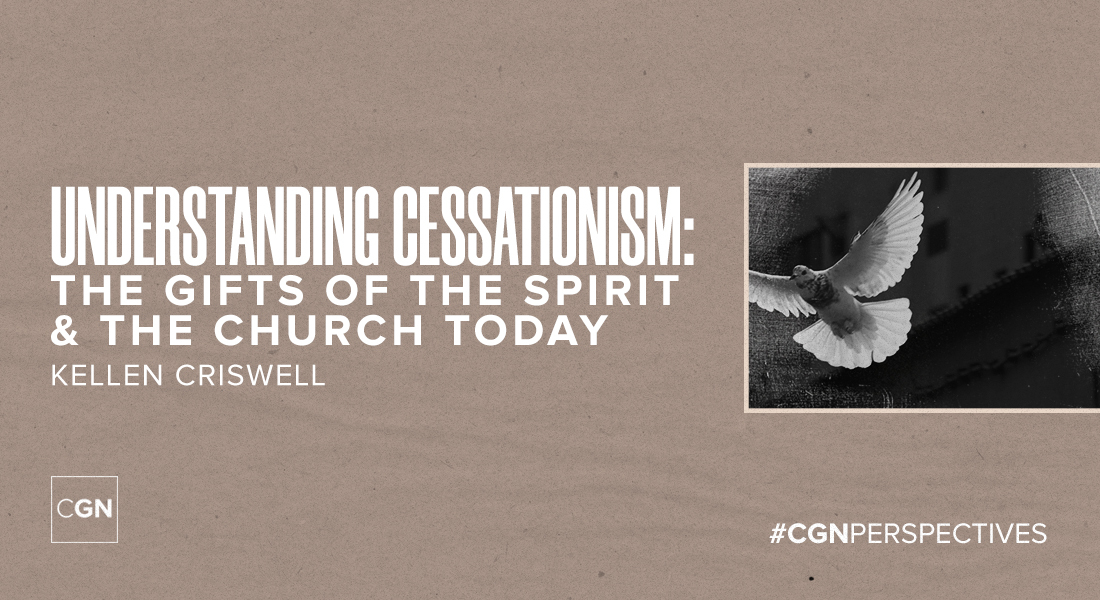
“Speaking in tongues is demonic.”
“Speaking in tongues is the evidence of Spirit baptism.”
“The gift of prophecy ceased in the life of the church with the death of the last foundational apostle.”
“God wants all Christians to walk in the prophetic ministry of the Holy Spirit.”
The debate over the current state of the gifts of the Spirit in the life of the church is alive and well! I have routinely heard or read Christians make all of the above statements in conversations regarding the work of the Spirit in the church today. These statements reflect an important, often heated discussion between many faithful followers of Jesus. I have personally held several positions on the issues related to the topic at different times of my Christian life. While one’s view on the place of the activities of the Spirit in the church today is not a central issue of importance in contrast to perspectives on the gospel or essential points of salvation, it is one I have come to be very passionate about. Mainly, I believe that where one falls on the issue of the gifts of the Holy Spirit has practical effects in Christian living and in the dynamics of Christian community. It leads to beliefs and actions that either help or hinder ways of relating to and understanding God, and ways of relating to and serving the body of Christ. It also impacts the potential we have as people and churches to most effectively guide people toward an authentic encounter and relationship with God.
For all of these reasons that elevate the importance of this issue, my hope in this upcoming series of articles is to humbly enter into the discussion as to whether all the manifestations of the Holy Spirit mentioned in Scripture are available and to be sought by the church today. In the articles that follow, I will attempt to provide a generous summary and evaluation of the two primary positions that have been contended for most on the subject. Along the way, I will offer an evaluation of some of the arguments offered in support of the primary views. I will also present my own views on the subject, including the biblical and practical reasons that have led to adopting them. My goal is not to arrogantly pretend to settle all the issues, but hopefully, to present a generous, helpful case for continuationism, along with some nuanced ways of approaching some pieces of the arguments for continuationism I have not found to be common.
In the rest of this article, I will offer a definition of cessationism, describe some of the main arguments for the position, and highlight some strengths that often characterize the perspectives and ministries of believers who hold to cessationism. In a subsequent post, I will offer a critique of a number of the main arguments offered in support of the cessationist position, so stay tuned for that on calvarychapel.flywheelsites.com if you are interested. With that said, let’s take the plunge.
Defining Cessationism
The essential claim of cessationism is that there are certain gifts or activities (charismata) of the Holy Spirit mentioned in Scripture that are not available or necessary for the church today. Tom Pennington, Pastor of Countryside Bible Church in Dallas, Texas, is an advocate of cessationism. He has written and lectured extensively on the position in partnership with Dr. John MacArthur, one of the more well-known and outspoken cessationists of the present time. In his 2013 article, “A Case for Cessationism,” Pennington offers this helpful summary of the position:
“So what do we mean by cessationism? We mean that the Spirit no longer sovereignly gives individual believers the miraculous spiritual gifts that are listed in the Scripture and that were present in the first century church. It is neither the Spirit’s plan, nor His normal pattern to distribute miraculous spiritual gifts to Christians and churches today as He did in the times of the Apostles. Those gifts ceased as normative with the apostles.”1
Common Arguments for Cessationism
There are numerous points of argumentation offered in support of the cessationist position. Below is a brief explanation of several of the more common arguments:
The Foundational Role of the Apostles
First, there is the argument from the foundational role of the apostles in establishing the church. Many cessationists believe that the gifts and offices of apostle and prophet were only in operation during roughly the first century of the church age. During that era, they contend, the church was being established through apostolic and prophetic preaching and mission, while the New Testament canon was being formulated under the inspiration of the Holy Spirit. After the founding of the church and formulation of the completed canon, the roles of apostles and prophets supposedly passed from the life of the church, along with many other manifestations and callings of the Holy Spirit. In support of this argument, respected theologian and cessationist, Dr. Tom Schreiner, writes:
“The apostles were uniquely appointed for the early days of the church to establish orthodox doctrine. There is no warrant, then, for saying there are still apostles today. Indeed, if anyone claims to be an apostle today we should be concerned, for such a claim opens the door to false teaching and to abuse of authority. If the gift of apostleship has ended, then other gifts may have ceased as well, since the foundation has been laid by the apostles and prophets (Ephesians 2:20).”2
The Authenticating Role of Miracles
Second, there is the argument from the authenticating role of miracles in the ministries of Jesus and the apostles. Cessationists point out that a key purpose of miracles and healings was to prove the Messianic identity of Jesus and demonstrate the divine origin of apostolic ministry (John 10:38; Hebrews 2:4). From this premise, it is contended that, after the earthly ministry of Jesus was completed and the foundational role of the apostles had been fulfilled, the need for such authenticating works of the Spirit ceased to exist. Summarizing the premise of this argument, author Tim Challies writes:
“The primary purpose of Jesus’ miracles was to confirm his credentials as God’s final and ultimate messenger (John 5:36; 6:14; 7:31; 10:24-26, 37-38). Jesus’ miracles were not primarily a tool for effective evangelism or about alleviating human suffering. The main reason the Holy Spirit empowered Jesus to perform miracles was to confirm that he was everything he claimed to be and that he spoke the words of God (Acts 2:22). Jesus gave this same power to the apostles, and their miracles served exactly the same purpose (Acts 14:3; cf. Hebrews 2:3-4).”3
The Absence of Charismata in Church History
Third, there is the argument from the alleged lack of examples of the gifts of the Spirit being manifested in local churches and the lives of followers of Jesus throughout church history. Some advocates of cessationism claim that between the first and 20th centuries, there is next to no mention of the so-called charismatic gifts of the Spirit in Christian texts of antiquity. They conclude from this alleged lack of historical references that there were no such experiences precisely because God had ceased granting them, having fulfilled His intended use for them.
The Closed Canon of Scripture
Fourth, there is the argument from a closed canon of Scripture. Evangelicals generally hold to a 66 book canon of Scripture, which represents God’s inspired, authoritative, inerrant revelation to mankind. All extra-biblical forms of revelation are considered subordinate to inspired Scripture. Working from this conviction, cessationists contend that a closed canon of Scripture removes the need for avenues of revelation like the gifts of prophecy or tongues (as if those were actually, or exclusively the mechanisms through which God provided the content of inspired scripture to the church). Some go so far as to say that openness to forms of ongoing revelation outside of the biblical text is dangerous. Dr. John MacArthur, noted above as one of the most avid and aggressive proponents of cessationism, often pushes this point in support of his view. For example, in a 2010 article he warns:
“Although charismatics deny that they are trying to add to Scripture, their views on prophetic utterance, gifts of prophecy, and revelation really do just that. As they add—however unwittingly—to God’s final revelation, they undermine the uniqueness and authority of the Bible. New revelation, dreams, and visions are considered as binding on the believer’s conscience as the book of Romans or the gospel of John.”4
The main biblical support for the closed canon argument is found in Paul’s words to the church at Corinth: “As for prophecies, they will pass away; as for tongues, they will cease; as for knowledge, it will pass away. For we know in part and we prophesy in part, but when the perfect comes, the partial will pass away” (1 Corinthians 13:8b-9, ESV). Many cessationists have asserted that “the perfect” mentioned in this text looked forward to the completion of the canon of Scripture. From this premise, it is reasoned that the 66 books of the Bible constitute a complete and perfect revelation of God to man, rendering void the need for all other revelatory spiritual mediums or gifts of God (i.e. prophecy).
The Absence of Modern Experience
Fifth, there is the argument from the reality that many faithful followers of Jesus do not contemporarily experience the so-called charismata (i.e. speaking in tongues, miracles, healing, prophesying, etc.). The cessationist reasons, if these gifts are intended to be the experience of the church today, why would God withhold them from so many of His people? Are they not spiritual enough? Are they second-class Christians in some sense? Cessationists say no, concluding that the real reason so many faithful followers of Jesus do not experience the charismata today is that those gifts are simply no longer in operation in the church.
Strengths Associated with Cessationism
Believe it or not, you are about to read a continuationist’s description of things they consider to be admirable about principles commonly associated with the cessationist position, and Christians who would self-identify as cessationists. While I disagree with cessationism, there are many things to commend in the lives, writings and ministries of cessationist Christians. These are general observations that do not apply to all who hold the cessationist position, to be sure. But it is important to note positive characteristics about Christians and theological perspectives with whom we may disagree. This is an important way of affirming our unity in the essential tenets of the gospel and showing Christian love toward one another.
A High View of Scripture
First, cessationists generally advocate for a high view of the written Word of God. They display a genuine desire to be accurate in biblical exegesis and orthodox in doctrine.
A Concern for God’s Glory
Second, many cessationists voice a valid concern that the glory of God be the central focus in corporate worship. They rightly point out that those who chiefly emphasize the manifestations of the Spirit in the gathered assembly of the local church often drift into man-centeredness and spiritual rivalry. The call to keep the glory of God as the focus and motive of corporate and individual worship is a legitimate and welcome charge.
A Thoughtful Faith
Third, cessationists contend for a thoughtful faith. They offer valid warnings to those who would supplant the careful, Spirit-empowered study of Scripture as the primary means of knowing God’s will and ways, with what often appears to be mere emotionalism and sensationalism. God indeed wants His people to think hard and study His written Word in pursuit of a deeper understanding of Him and intimacy with Him (2 Timothy 2:7; 3:15).
A Correction to Excess
Fourth, cessationist teachings have provided many able refutations of what I would consider excessive, extra-biblical applications and pursuits of the manifestations of the Spirit, which can be abuses of the otherwise legitimate embrace of the gifts of the Spirit. Paul’s exhortations to the Corinthians about the gifts of the Spirit were not written to a cessationist church, but to a church overflowing with powerful manifestations of charismata. Cessationists, while perhaps going too far in the direction of restraint, do provide many corrective insights to people and churches who go too far in their desire to embrace and practice the so-called charismatic gifts of the Spirit.
What’s Next?
In the next post in this series, I will offer some critiques of the arguments for cessationism described above. Again, stay tuned at calvarychapel.flywheelsites.com.
Notes:
1 Pennington, Tom. “A Case for Cessationism”. Grace to You. October 17, 2013.
2 Schreiner, Tom. “Why I Am A Cessationist”. The Gospel Coalition. January 22, 2014.
3 Challies, Tim. “Strange Fire Conference: A Case for Cessationism”. Challies. October 17, 2013.
4 MacArthur, John. “Prophecy and the Closed Canon, Part 3”. Grace to You. January 4, 2010.








